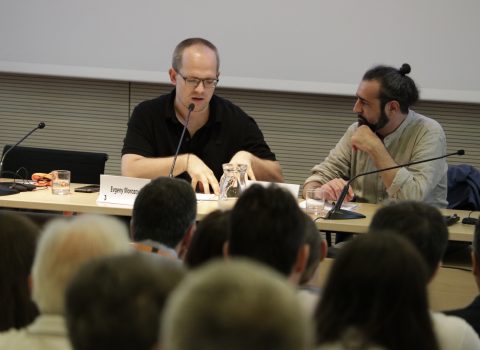Commonfare: an Approach to Welfare for the 21st Century?
"Rethinking the economy of digital platforms in social innovation": a Conversation with Maurizio Teli, Reserch & Innovation coordinator of Commonfare.net, recently invited by Eit Digital for an Innovation Talk about the co-op platform and paradigm
“The term ‘digital spaces’ refers to the interpretive metaphor of social relations mediated by digital network technologies – the main contemporary example is that of social media – understood as a relational as well as a technological space.
If, in the 90s, enthusiastic documents proliferated – such as the Declaration of Independence of Cyberspace – characterized by the libertarian traits of the Californian ideology, today the metaphor that seems to describe better the great social and technological platforms has changed significantly to take on the appearance of walled gardens, that is to say a set of closed spaces in which access and circulation of contents are controlled. This transformation shows us how the socially constructed imaginaries around the network have passed from a techno-utopian horizon of exploration, enlargement of knowledge and openness, typical of the 90s – that of the enchanted by the network – to the current imaginary, of opposite sign, made of selective inclusion and widespread precariousness, which characterizes the second decade of the years 2000, crossed by a deep economic crisis, by the withdrawal of desires and feelings of fear. In this new interpretative framework, the boundaries of work – and the social practices that characterize it – are radically redefined. Forms of new enclosures are born – fenced spaces, in fact – that are based on the expropriation of public or common goods and on the exploitation of free or voluntary activities. On the one hand, therefore, a commercialization of texts, compositions and images that are present in the web and in common use is put in place, on the other social interactions and shared experiences on the net are valued, in a logic that follows the spread of voluntary and unpaid work.
The golden age of digital technologies intended as an emancipation machine appears exhausted. Despite this, among those who work with technologies, produce them, observe them or are simply immersed in them, there are those who continue to be involved in attempts at social transformation that leverage the possibilities of collaborative organization of important areas of economic processes.” (*)
Platform cooperativism is a growing international movement that builds a fairer future of work. It’s about social justice and the bottom line. Rooted in democratic ownership, co-op members, technologists, unionists, and freelancers create a concrete near-future alternative to the extractive sharing economy.
The platform economy is fostering rapid changes in economic, social, and political life, from political campaigning to new forms of currencies. Doing so, digital platforms interact with existing institutions in different ways, relying on some – e.g. the financial market – and weakening others – e.g. labor protection laws, and the innovation they bring includes transforming institutions themselves.
Making good on the early promise of the Web to decentralize the power of apps, protocols, and websites, platform co-ops allow households with low and volatile income to benefit from the shift of labor markets to the Internet. Steering clear of the belief in one-click fixes of social problems, the model is poised to vitalize people-centered innovation by joining the rich heritage and values of co-ops with emerging Internet technologies.
In this panorama, Commonfare.net provides a platform for everyone to share experiences, foster ventures, and connect with people who want to support each other. It is not a social network. Rather, commonfare.net is a platform for social innovation intended for developing relationships among people through mutual help.
(*) PLATFORM CAPITALISM E CONFINI DEL LAVORO NEGLI SPAZI DIGITALI, by E. Armano, A. Murgia, M. Teli, MIMESIS 2017, pages 7-8.


